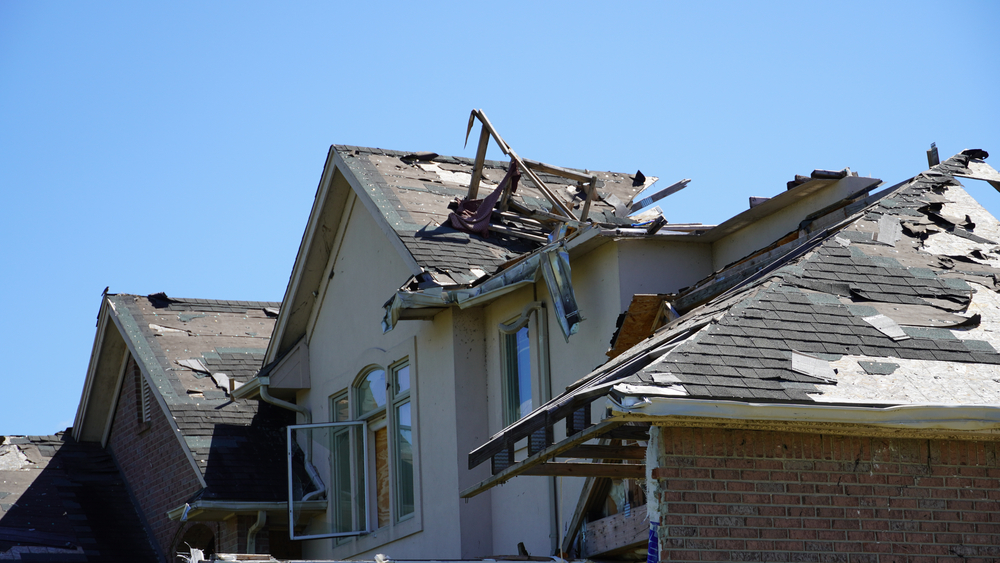
As a homeowner, there are few things as frustrating as dealing with property damage and subsequent insurance claims. If you’re reading this, it probably means that you’ve experienced roof damage and now you’re looking for information about filing an insurance claim. So let’s get right to it.
As you know, roof damage caused by a storm, a natural disaster, or a severe weather event can lead to extensive repairs and financial strain. Understanding the process of filing a roof insurance claim is crucial to ensuring you receive the compensation you deserve.
First and foremost, if you’re filingroof insurance claims for storm damage, make sure that everyone is safe and that the storm hasn’t resulted in any dangerous living conditions.
Don’t let insurance disputes or property damage claims overwhelm you. Reach out to Tighe P.A. for professional guidance and effective solutions for your roof insurance claim.Book your free consultation and learn more about how Tighe P.A. can help with your case.
5 Steps for Filing a Wind or Storm Damage Roof Insurance Claim in Florida
1. Contact your insurance claim lawyer
Before you file a roof claim or contact an insurance agent, the first thing you want to do is contact your insurance claim lawyer. They will help you navigate the rest of the process to ensure that you get the maximum payout and help you deal with your insurance provider.
2. Assess and document the damage:
The more details about the damage you can document, the better. This means writing a description of the damage, as well as taking photos. Be thorough. Look for signs of damage like loose or missing shingles, holes or obvious leaks, damaged fittings or gutters, or anything else that seems out of the ordinary. The success of your roof insurance claim depends on it!
3. Inform your homeowner’s insurance company
Your insurance company almost certainly requires that you report any damage within a certain timeframe. Failure to do this can result in a denial of your claim. At this point, you’ll need the following: name, policy number, address, the reason for the damage, and a detailed description of the damage to give to your insurance company.
4. Schedule a visit with the roof insurance claim adjuster
At this point, you’ll often have an insurance adjuster come to verify the damage. The insurance adjuster will perform a detailed inspection of the damage and will request any receipts, photos, or other materials relevant to the damage.
In regards to your roof claim, the insurance adjuster plays a vital role in determining the extent of the damage, verifying the cause, and estimating the cost of roof repairs or replacement. The insurance adjuster will directly impact the amount of compensation you receive from your claim. Homeowners should strongly consider getting the opinion of a second, independent adjuster.
5. Obtain repair estimates from roofing contractors
Contact a roofing contractor to determine the replacement cost. Make sure the roofing contractor extensively documents their findings, as this will be essential to your roof damage claim.
Beware Of Roofing Contractor Scams
In the aftermath of a storm or other damaging event, it’s essential to be cautious when selecting a roofing contractor to repair your roof. Unfortunately, there are unscrupulous contractors who may take advantage of vulnerable homeowners. Toprotect yourself from contractor scams, consider the following tips:
Research and verify credentials
Before hiring a roofing contractor, research their reputation and verify their credentials. Look for online reviews, check if they’re licensed and insured, and ensure they have a permanent business address and contact information.
Get multiple estimates
Obtain at least three written estimates from different contractors. This will help you understand the fair market price for repairs and make it easier to identify potential scams or inflated prices.
Beware of high-pressure tactics
Be cautious of contractors who use high-pressure sales tactics or demand immediate decisions. Legitimate contractors should be willing to provide you with enough time to review their proposal and compare it with other estimates.
Avoid large upfront payments
While it’s not uncommon for contractors to request a deposit before starting a roof replacement, be wary of those who demand a large upfront payment or the entire replacement cost upfront. Instead, negotiate a reasonable payment schedule tied to the completion of specific milestones. This will vary depending on where the damage occurs and if it affects the entire roof or not.
Get a written contract
Always insist on a written contract that clearly outlines the scope of work, materials to be used, the estimated timeline, and the total roof replacement cost. Make sure you read and understand the contract before signing.
Communicate with your insurance company
Keep your insurance company informed about the repairs and the contractor you’ve chosen. Your insurance company may have recommendations or requirements that you need to follow in order to receive proper reimbursement.
The most important takeaway: Keep records! Maintain a file with all documentation related to the claim, including photos, repair estimates, and correspondence with the insurance company.
What If My Insurance Claim is Denied?
Dealing with a denied insurance claim can be frustrating and confusing, but it’s important to remember that you have options to challenge the decision. Follow these steps if your roof damage insurance claim is denied:
Review the denial letter
Carefully read the denial letter from your insurance company to understand the reasons for the denial. This letter should provide a clear explanation of why your claim was denied and the specific policy provisions that support the decision.
Gather additional evidence
If you believe the denial is unjust, gather additional evidence to support your claim. This may include updated repair estimates, additional photographs of the damage, or expert opinions from contractors or engineers.
File an appeal
Submit a written appeal to your insurance company, including the new evidence and a detailed explanation of why you believe your claim should be approved. Be sure to follow any specific procedures outlined in your policy or the denial letter, such as deadlines for filing an appeal.
Consider mediation or appraisal
If your appeal is unsuccessful, you may be able to resolve the dispute through mediation or appraisal, as outlined in your insurance policy. Mediation involves a neutral third party who helps both parties reach a resolution, while appraisal involves hiring an independent appraiser to determine the value of the loss.
Consult with an experienced attorney
If your claim is still denied after exhausting these options, it’s time to consult with a skilled attorney like those at Tighe P.A. They can evaluate your case, advise you on your legal options, and potentially file a lawsuit against your insurance company for acting in bad faith or breaching the terms of your policy.
Remember, it’s crucial to act promptly and follow the proper procedures when dealing with a denied insurance claim. Tighe P.A.’s experienced attorneys can help guide you through the process and fight for the compensation you deserve.
The Benefits of Hiring a Roof Damage Insurance Claim Lawyer
Working with a roof damage insurance claim lawyer from Tighe P.A. can significantly improve your chances of a successful claim and protect you from an unscrupulous insurance company. Their expertise and resources include conducting complete inventories and valuations, contacting contractors for repair quotes, accurately organizing and filing claims, corresponding with insurance adjusters, evaluating and negotiating settlement offers, and filing suits against insurers acting in bad faith.
While an attorney isn’t technically required, it can mean the difference between getting paid and getting denied.
At Tighe P.A., we can help you file your claim accurately to maximize your potential for a full, swift payout. In the event that your claim is denied, we’re here to fight for your rights, whether that means mediating a settlement or litigating the matter in court.
Our team offers decades of experience handling a comprehensive range of insurance matters, and we’ve helped hundreds of clients recover tens of millions of dollars in funds. When it comes to your rights as a homeowner, we’re your tireless defender, and we’ll do everything possible to get you the money you’re owed so that you can make repairs and get life back to normal.
When you need a roof damage insurance claim lawyer, contact Tighe P.A. today at (855) 567-7776 to schedule your free consultation.
Types of Roof Damage Homeowners’ Insurance Covers
Whether it’s your entire roof or just a part, understanding the types of roof damage covered by homeowners’ insurance is essential for knowing what to expect when you go to file a roof claim. Here are some common types of roof damage covered by most insurance policies:
Lightning and Fire Damage
Homeowners’ insurance generally covers roof damage caused by lightning strikes and the subsequent fire. This coverage typically includes repair or replacement costs for the roof, as well as any damage to the home’s structure or personal property inside.
Damage from Water and Freezes
Insurance policies usually cover roof damage resulting from water and freeze-related issues, such as ice dams or burst pipes. However, coverage may be limited or excluded if the damage is caused by a lack of proper maintenance or failure to take preventative measures, such as insulating pipes and cleaning gutters.
Hail Damage
Hail damage is a common cause of roof damage and is often covered by homeowners’ insurance. Coverage for hail damage may include repair or replacement of the roof, depending on the extent of the hail damage and whether or not your insurance company covers this type of damage.
Wind and Hail Damage Deductibles
It’s important to note that some insurance policies have separate wind and hail damage deductibles, which may be higher than your standard deductible. Be sure to review your policy to understand how this might affect your claim.
Bodily Injury and Property Damage
Homeowners’ insurance typically covers bodily injury and property damage that occurs as a result of roof damage. For example, if a falling tree branch damages your roof and injures someone, your policy may cover medical expenses and property repair costs.
Remember, the coverage provided by your homeowners’ insurance policy depends on the specific terms and conditions. It’s essential to thoroughly review your policy and consult with an experienced attorney like those at Tighe P.A. to ensure you understand the coverage and limits applicable to your situation.
Let Tighe P.A. Help With Your Insurance Claims Process
Dealing with roof damage and navigating the insurance claim process can be challenging and stressful. At Tighe P.A., our experienced attorneys are dedicated to fighting for your rights and ensuring you receive the compensation you deserve.
With a proven track record of success against powerful insurance companies, we have the expertise and resources to guide you through the process and handle any disputes that may arise.
Don’t let insurance claim complexities overwhelm you.
Choose Tighe P.A. for personalized, effective, and results-driven legal representation. Contact us today for a free consultation and let us put our knowledge and experience to work for you. Together, we can make sure your claim is handled fairly and that you get the compensation you need to repair your roof and move forward.



